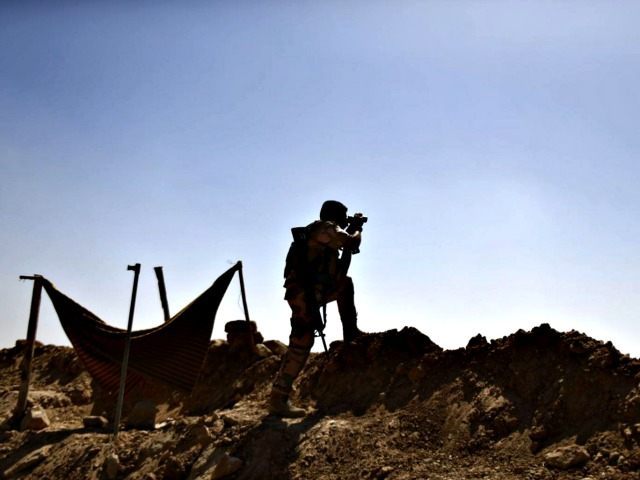Turkey has grown increasingly vocal, and even belligerent, in criticizing the Kurds and U.S. military support for their cause in Syria and Iraq. The situation took a disturbing turn when Turkish Prime Minister Ahmet Davutoglu threatened to attack Kurdish fighters in Syria if they are found to be passing American weapons back to Kurdish insurgents in Syria.
As if Syria was not in enough of a military and diplomatic meltdown already, a NATO member is considering bombing the vital U.S. ally on the ground against ISIS while American planes and drones are flying missions out of a Turkish airbase.
Kurdish news agency Rudaw reports Davutoglu’s threats were prompted by the recent, highly-publicized airlift of American weapons and ammunition to the Kurds and allied forces in Syria. Some of those forces are currently under air attack by Russia and may soon find themselves pouring American bullets into advancing Syrian, Iranian, and Cuban (yes, Cuban!) ground troops.
The Turks are concerned that Kurdish Democratic Union Party (PYD) militias in Syria will pass guns and ammo back to the Kurdistan Workers’ Party (PKK) in Turkey, which has clashed with Turkish security forces and been targeted by Turkey’s air force. The Turks harbor suspicions that Syria’s anti-ISIS Kurdish fighters are more closely linked to the PKK than is generally acknowledged, and their primary regional strategic fear is the emergence of a unified Kurdish state—a prospect that worries them much more than the Islamic State.
Conversely, some Kurds have charged Turkey with either indulging ISIS or actively supporting them, while a variety of Turkish opposition groups think the government of Davutoglu and President Recep Tayyip Erdogan is using the threat of PKK and ISIS terror attacks as an excuse to crack down on all dissent.
“If you send weapons to PKK in Turkey, we will treat you as PKK and attack you inside Syria,” Davutoglu said to Syrian Kurds, after touring the site of a recent bomb attack in Ankara.
“Whenever we find weapons in Turkey they will be destroyed, because the weapons dropped to PYD will be obtained by PKK too, and they are going to use them against the Turkish state,” Davutoglu continued. “Recently, on the one hand PKK is attacking Turkey, on the other; PYD receives weapons, and later these weapons are going to be used against Turkey.”
The government has detained suspects linked to both the PKK and ISIS for the Ankara attack. Details of the investigation are not easy to come by, because the Erdogan government banned reporters from covering it.
Even though one of the bombers has been positively identified as the brother of an ISIS member who died in a suicide-bombing attack last summer, and many of the Ankara victims were Kurdish activists, the government seems to be working hard to loop in the PKK. The Wall Street Journal notes that even though Kurdish forces are battling the Islamic State in Syria, Davutoglu has alleged a meeting between PKK representatives and ISIS to plan coordinated terrorist actions against Turkey.
Not coincidentally, elections in Turkey are only three weeks away, and the ruling party suffered last time because the pro-Kurdish party did exceptionally well at the polls. It will be a lively election, because even as Erdogan and Davutoglu accuse the mainstream Kurdish HDP party of being in league with PKK terrorists, the HDP’s leadership has accused the government of falsely implicating Kurds in the Ankara bombings, or even setting off the bombs itself, in a false-flag operation to work up public fears and discredit the mainstream Kurdish party.
State Department spokesman John Kirby reaffirmed American support for Kurdish fighters in Syria on Wednesday. “The focus in Syria for the United States and the other 60-plus members of the coalition is counter-ISIL. And we will continue to appropriately support those groups that are proving effective against ISIL inside Syria,” he declared.
Kirby also insisted that the Administration would “continue to talk to the Turkish government about their concerns, specifically with respect to the Syrian Kurds.”
Hurriyet Daily News notes that Kirby did not directly address Davutoglu’s more belligerent statements, or his assertion that his government had summoned the ambassadors from the U.S. and Russia to complain about their ties to the Kurds.

COMMENTS
Please let us know if you're having issues with commenting.